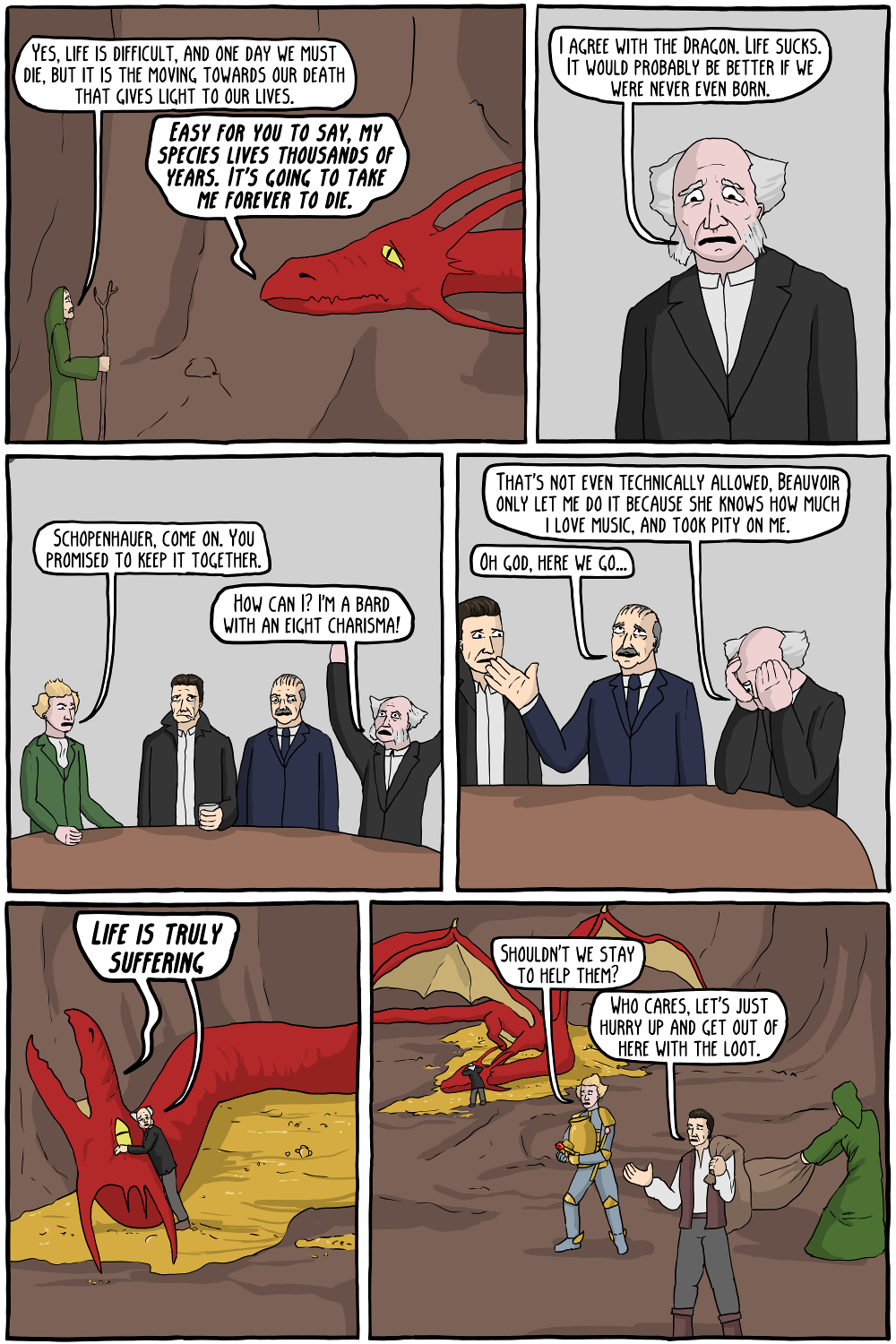
Shared posts
Saturday Morning Breakfast Cereal - Perception of Colors

Click here to go see the bonus panel!
Hovertext:
Also, when people give me a drawing that's either a duck or a rabbit, I just see a meaningless arrangement of ink and paper.
New comic!
Today's News:
Saturday Morning Breakfast Cereal - The Largest Number

Click here to go see the bonus panel!
Hovertext:
At the end of the Universe, all series will converge.
New comic!
Today's News:
Only two days left to get your BAHFest MIT proposals in!
Saturday Morning Breakfast Cereal - Nightmares

Click here to go see the bonus panel!
Hovertext:
Brain would like you to read comics for a while so Brain can take a break.
New comic!
Today's News:
Saturday Morning Breakfast Cereal - The Consolation of Philosophy

Click here to go see the bonus panel!
Hovertext:
Of course, I personally would never go out in the cold.
New comic!
Today's News:
Two days left to get in your BAHFest London proposal!
Saturday Morning Breakfast Cereal - The Talk
%20(1).png)
Click here to go see the bonus panel!
Hovertext:
Somewhere in the multiverse, there's a superior universe where all comics are this dorktastic.
New comic!
Today's News:
Drawn with great humility and thanks to one of my favorite people. Scott did all of the real work, and I threw in some dirty jokes. So, hey, a pretty good deal all around.
Also,
Wednesday Book Reviews!
Our Magnificent Bastard Tongue (McWhorter)
I’m still on this McWhorter kick. This one was good, but not as good as some of the others. It’s about English and its interactions with other languages. The bulk of the book is about the idea that repeated conquests of English speakers resulted in English being particularly simplified in terms of its grammar, especially compared to related languages. There is also a large section on a proposed link between Celtic and English grammar, and even a section positing links between German and Hebrew. The latter idea is based on the work of Theo Vennemann, whose ideas are (as far as I could tell from google and wikipedia) found to be interesting but probably wrong. Because it’s McWhorter, there’s also a long lament about the popular usage of the Sapir-Whorf hypothesis. You get the feeling that his later book “The Language Hoax” was a great unburdening of linguistic angst.
An Extraordinary Time (Levinson) This is yet another book about the idea that we are in a period of stagnation in terms of economic improvement for the average western person. Although it was enjoyable, as a book it didn’t make a strong argument. Most of the book is (admittedly fascinating) historical tidbits about technological development, mostly in the 20th century leading up to the 1970s. Levinson’s perspective ultimately agrees with that of Robert Gordon and Tyler Cowen, at least to the extent that they all blame the nature of post-1970s technology for the failure to improve the average person’s life. And, like, the others, Levinson has hope that a few technologies on deck (e.g. self-driving cars) will reverse that trend.
All the Gallant Men (Stratton, Gire) A great memoir and oral history about a man who was on the USS Arizona when the attack at Pearl Harbor happened. As these things go, it’s not necessarily a standout, but I always appreciate memoirs that give you a real sense of the person. Stratton talks about particular people and how he felt about them, as well as how he felt about certain political and social occurrences that followed the war. For instance, he talks about how he generally doesn’t like these attempts to get American and Japanese WWII vets together to make nice. To him, the memories are too horrific. Given what he saw on that day, and the year it took his to recover, it’s hard to blame him.
Mike Rowe on Charles Koch
I agree wholeheartedly with Mike Rowe that college has been oversold and that we need a greater focus on and respect for vocational education. I’ve also been impressed with Rowe’s honesty and intelligence as is evident in this recent post discussing his work with Charles Koch on vocational education.
If you haven’t seen it, my name appeared a few weeks ago in a headline next to Koch Industries. What could possibly go wrong?
Well, let’s have a look.
Pablo Elvira says…Mike – I’ve never written a “protest” email before now, but I’m compelled. Your association with The Koch Brothers has obliterated my trust in you.
Steven Stahl writes… I have lost a huge amount of respect for you. Mike, you are better than this.
Mande Smogor says…Charles Koch promotes fear mongering on climate change, and basically destroy minorities, the elderly, anyone who isn’t rich, and unions. Morally and ethically I am profoundly disconnected from Mike Rowe right now. #SoLongDecadeLongCelebrityCrush…etc, etc.
You can set your watch by it. Whenever my name appears next to an individual on someone’s “List of Known Enemies,” people line up to tell me why they can no longer be my friend, or watch my shows, or support my foundation. From Glenn Beck to Bill Maher, my proximity over the years to the “wrong guy” has prompted hundreds of Facebook friends to scoop up their marbles and stomp off in a huff….
Like most of you, my opinion of public figures is influenced by what I read in the press, and what I read about The Brothers Koch leaves little doubt they they ride with The Four Horsemen of The Apocalypse. Over the last few years though, my opinion has changed. Partly, because I took it upon myself to read beyond the headlines, and partly because I came to learn that our foundations are aligned on a number of issues important to me.
…We met a few years ago in California. I had just given a speech about the disastrous consequences of removing vocational education from high schools, and Charles was in the audience. One of his people invited me to lunch, and I said sure. I was eager to see the horns and smell the sulphur for myself. Surprisingly, I found neither. What I found, was a 78-year-old man with more energy and enthusiasm than I could match. We spoke at length, and I learned a number of surprising things.
I learned for instance, about his passion for criminal justice reform. He’s frustrated by the fact that punishments no longer fit the crime, and angered that minor drug offenders and rapists often serve comparable sentences. He’s proud that Koch Industries does not ask those applying for employment to “check the box” with regard to previous incarceration. He told me that once a debt is paid, the balance sheet should be clear. I was surprised, because the man I had read about seemed very much at odds with a crusader for the formerly incarcerated.
We then talked at length about the dangers of a two-tiered economic system, and his belief that cronyism was at the heart of so much unfairness in today’s society. Charles told me about a documentary his foundation funded that exposed the obscene policy of charging people (black women, primarily) thousands of dollars for a license that allows them to legally braid hair in their communities. I watched it later, and it made me angry. It also made me think about the hundreds of entrepreneurs I’d met over the years who expressed similar frustrations in their own industries. Again, I was surprised. I had read nothing from anyone about Koch’s concern for the little guy. Not what I expected.
But I was most surprised by his commitment to reinvigorate the skilled trades. I knew his foundation focused on many forms of higher education, but I had no idea we shared a common view regarding the skills gap. He pointed out that countless small businesses begin with a tradesperson who learned a skill that was in demand. I shared my belief that a chronic skills gap was more troubling than chronic unemployment, because the existence of opportunity that people don’t care about is more alarming than a lack of opportunity overall.
In short, we found ourselves in violent agreement on a number of things important to us both, and after lunch, he told me to let him know if mikeroweWORKS could ever use his help. (In hindsight, it’s entirely possible he was just being polite, but he would soon learn just how literal I can be.)
When I got involved with Project Jumpstart in Baltimore, I called Charles and told him about their incredible track record preparing inner city kids and non-violent offenders for a career in the trades. At base, Jumpstart is a pre-apprenticeship program for the construction trades. The placement rate is an astonishing 80%. Jumpstart not only trains people for the job at hand, it helps them solve problems that often prevent people in their position from succeeding. They pay a stipend, for instance, while being trained. They help with transportation to the job site, and provide extraordinary mentorship and follow up. But there are also consequences. Trainees can lose their stipends if they don’t comply with the rules. I spoke with many of the graduates, and they all talked about how important the “real world training” was to their success. When I told Charles about the program, his foundation stepped up.
When SkillsUSA came around this year, I told him I was speaking at their opening ceremony. He wasn’t familiar with the program. When I explained its impact on the next generation of skilled tradespeople, he was once again intrigued. He wanted to know how an organization that did so much good, and consisted of nearly 400,000 kids, was unknown to so many. I told him the challenge facing SkillsUSA was not so different than the challenge facing many companies looking to recruit skilled labor – basic awareness. I told him my foundation made sure that kids who qualified for the National Finals had their transportation and lodging covered, if they couldn’t afford to get there on their own. Charles liked that, and he doubled the resources we had allocated for this year’s event.
Most recently, The Koch Foundation allowed mikeroweWORKS to help more people than ever before through our Work Ethic Scholarship Program….
So – to Pablo, Steven, Mande, and anyone else compelled to share their disappointment – I get it. But look – if I only associate with “approved people,” or limit my relationships to those who see the world exactly as I do, then I might as well build a church and preach only to the choir. Where is the fun in that? The truth is, progress only happens when people find common ground and build something on it. And when it comes to closing the skills gap, we need progress.
Good for Rowe! It’s well known, of course, but my own institution, George Mason, has also benefited from Charles Koch’s investments in education.
The post Mike Rowe on Charles Koch appeared first on Marginal REVOLUTION.
Straight thinking about Bayer and Monsanto
That is my latest Bloomberg column, hardly anyone has a consistent and evidence-based view on this deal. Here is one bit:
Critics who dislike Monsanto for its leading role in developing genetically modified organisms and agricultural chemicals shouldn’t also be citing monopoly concerns as a reason to oppose the merger — that combination of views doesn’t make sense. Let’s say for instance that the deal raised the price of GMOs due to monopoly power. Farmers would respond by using those seeds less, and presumably that should be welcome news to GMO opponents.
Yet on the other side:
What does Bayer hope to get for its $66 billion, $128-a-share offer? The company has argued that it will be able to eliminate some duplicated jobs and expenses, negotiate better deals with suppliers and invest more funds in research and development. Maybe, but the broader reality is less cheery. There is a well-known academic literature, dating to the early 1990s, showing that acquiring firms usually decline in value after tender offers, especially after the biggest deals. Mergers do not seem to make companies more valuable or efficient.
And this:
The whole Bayer-Monsanto case is a classic example of how a vociferous public debate can disguise or even reverse the true issues at stake. If Bayer fails to close the deal for Monsanto, Bayer shareholders may be the biggest winners. The biggest losers from a failed deal may be its opponents, who will spend the rest of their lives in a world where misguided judgments of corporate popularity have increasing sway over laws and regulations.
Do read the whole thing.
The post Straight thinking about Bayer and Monsanto appeared first on Marginal REVOLUTION.
Saturday Morning Breakfast Cereal - Teach a Man to Fish

Hovertext:
In economics, they're robots. In political economy, they're all jerks. In sociology, they're all misunderstood.
New comic!
Today's News:
One Last Time
August 26 marks ten years of Wonderella, and also the end of the weekly schedule (see Announcements for more info on that).
I don't care to toot my lobsters, but a few people have recently asked about my favorites. Looking back, here are a few selections:
- Guess Who's Coming to DINNER
- Shark and Shark ALIKE
- 99 LuftWAFFEballons
- ANIMUS Complex
- LED Astray
- STUCK In Your Head
- It’s What’s For SINNERS
- Baby Got BACKBURNERED
- GAYS and Confused
- SNOWSferatu
- PASTURE and Commander
- While My Guitar Gently WEAPONIZES
- Hook, Line and DRINKER
- Love GETAWAY
- SUMATRA of Life and Death
- NaCl SANDWICH
Final weekly comic pops next weekend!
Saturday Morning Breakfast Cereal - Afterlife
Saturday Morning Breakfast Cereal - Sword of Democracy

Hovertext:
See that sword for a democratic republic? Let's slowly push it back into the stone.
New comic!
Today's News:
Laissez-Faire in Tokyo Land Use
Tokyo, Japan’s capital city, has a growing population of over 13 million people but house prices have hardly increased in twenty years. Why? Tokyo has a laissez-faire approach to land use that allows lots of building subject to only a few general regulations set nationally. Robin Harding at the FT has a very important piece on the Tokyo system:
Here is a startling fact: in 2014 there were 142,417 housing starts in the city of Tokyo (population 13.3m, no empty land), more than the 83,657 housing permits issued in the state of California (population 38.7m), or the 137,010 houses started in the entire country of England (population 54.3m).
Tokyo’s steady construction is linked to a still more startling fact. In contrast to the enormous house price booms that have distorted western cities — setting young against old, redistributing wealth to the already wealthy, and denying others the chance to move to where the good jobs are — the cost of property in Japan’s capital has hardly budged.
This is not the result of a falling population. Japan has experienced the same “return to the city” wave as other nations.
How is this possible? First Japan has a history of strong property rights in land:
Subject to the zoning rules, the rights of landowners are strong. In fact, Japan’s constitution declares that “the right to own or to hold property is inviolable”. A private developer cannot make you sell land; a local government cannot stop you using it. If you want to build a mock-Gothic castle faced in pink seashells, that is your business.
But this alone cannot explain everything because there was a huge property price-boom in Japan circa 1986 to 1991. In fact, it was in dealing with the collapse of that boom that Japan cleaned up its system, reducing regulation and speeding the permit approval process.

…in the 1990s, the government relaxed development rules, culminating in the Urban Renaissance Law of 2002, which made it easier to rezone land. Office sites were repurposed for new housing. “To help the economy recover from the bubble, the country eased regulation on urban development,” says Ichikawa. “If it hadn’t been for the bubble, Tokyo would be in the same situation as London or San Francisco.”
Hallways and public areas were excluded from the calculated size of apartment buildings, letting them grow much higher within existing zoning, while a proposal now under debate would allow owners to rebuild bigger if they knock down blocks built to old earthquake standards.
Rising housing prices are not an inevitable consequence of growth and fixed land supply–high and rising housing prices are the result of policy choices to restrict land development.
The policy choices were made–they can be unmade.
The post Laissez-Faire in Tokyo Land Use appeared first on Marginal REVOLUTION.
Mao’s Crimes Against Humanity
From Frank Dikötter’s short note at History Today:
In the People’s Republic of China, archives do not belong to the people, they belong to the Communist Party. They are often housed in a special building on the local party committee premises, which are generally set among lush and lovingly manicured grounds guarded by military personnel. Access would have been unthinkable until a decade or so ago, but over the past few years a quiet revolution has been taking place, as increasing quantities of documents older than 30 years have become available for consultation to professional historians armed with a letter of recommendation. The extent and quality of the material varies from place to place, but there is enough to transform our understanding of the Maoist era.

…What comes out of this massive and detailed dossier is a tale of horror in which Mao emerges as one of the greatest mass murderers in history, responsible for the deaths of at least 45 million people between 1958 and 1962. It is not merely the extent of the catastrophe that dwarfs earlier estimates, but also the manner in which many people died: between two and three million victims were tortured to death or summarily killed, often for the slightest infraction. When a boy stole a handful of grain in a Hunan village, local boss Xiong Dechang forced his father to bury him alive. The father died of grief a few days later. The case of Wang Ziyou was reported to the central leadership: one of his ears was chopped off, his legs were tied with iron wire, a ten kilogram stone was dropped on his back and then he was branded with a sizzling tool – punishment for digging up a potato.
…Fresh evidence is also being unearthed on the land reform that transformed the countryside in the early 1950s. In many villages there were no ‘landlords’ set against ‘poor peasants’ but, rather, closely knit communities that jealously protected their land from the prying eyes of outsiders – the state in particular. By implicating everybody in ‘accusation meetings’ – during which village leaders were humiliated, tortured and executed while their land and other assets were redistributed to party activists recruited from local thugs and paupers – the communists turned the power structure upside down. Liu Shaoqi, the party’s second-in-command, had a hard time reining in the violence, as a missive from the Hebei archives shows: ‘When it comes to the ways in which people are killed, some are buried alive, some are executed, some are cut to pieces, and among those who are strangled or mangled to death, some of the bodies are hung from trees or doors.’
The post Mao’s Crimes Against Humanity appeared first on Marginal REVOLUTION.
Results Free Review
If researchers test a hundred hypotheses, 5% will come up “statistically significant” even when the true effect in every case is zero. Unfortunately, the 5% of papers with statistically signficant results are more likely to be published, especially as these results may seem novel, surprising or unexpected–this is the problem of publication bias.
A potentially simple and yet powerful way to mitigate publication bias is for journals to commit to publish manuscripts without any knowledge of the actual findings. Authors might submit sophisticated research designs that serve as a registration of what they intend to do. Or they might submit already completed studies for which any mention of results is expunged from the submitted manuscript. Reviewers would carefully analyze the theory and research design of the article. If they found that the theoretical contribution was justifiably large and the design an appropriate test of the theoretical logic, then reviewers could recommend publication regardless of the final outcome of the research.
In a new paper (from which the above is quoted) the editors of a special issue of Comparative Political Studies report on an experiment using results-free review. Results-free review worked well. The referees spent a lot of time and effort thinking about theory and research design and the type of institutional and area-specific knowledge that would be necessary to make the results compelling. The quality of the submitted papers was high.
What the editors found, however, was that the demand for “significant” results was very strong and difficult to shake.
It seems especially difficult for referees and authors alike to accept that null findings might mean that a theory has been proved to be unhelpful for explaining some phenomenon, as opposed to being the result of mechanical problems with how the hypothesis was tested (low power, poor measures, etc.). Making this distinction, of course, is exactly the main benefit of results free peer review. Perhaps the single most compelling argument in favor of results-free peer review is that it allows for findings of non-relationships. Yet, our reviewers pushed back against making such calls. They appeared reluctant to endorse manuscripts in which null findings were possible, or if so, to interpret those null results as evidence against the existence of a hypothesized relationship. For some reviewers, this was a source of some consternation: Reviewing manuscripts without results made them aware of how they were making decisions based on the strength of findings, and also how much easier it was to feel “excited” by strong findings This question even led to debate among the special issue editors on what are the standards for publishing a null finding?
I’ve seen this aversion to null results. In my paper with Goldschlag on regulation and dynamism, we find that regulation does not much influence standard measures of dynamism. It’s been very hard for reviewers to accept this result and I don’t think it’s simply because some referees believe strongly that regulation reduces dynamism. I think referees would be more likely to accept the exact same paper if the results were either negative or positive. That’s unscientific–indeed, we should expect that most results are null results so this should give us, if anything, even more confidence in the paper!–but as the above indicates, it’s a very common reaction that null results indicate something is amiss.
Here, by the way, are the three papers reviewed before the results were tabulated. I suspect that some of these papers would not have been accepted at this journal under a standard refereeing system but that all of these papers are of above average quality.
The Effects of Authoritarian Iconography: An Experimental Test finds “no meaningful evidence that authoritarian iconography increases political compliance or support for the Emirati regime.”
Can Politicians Police Themselves? “Taking advantage of a randomized natural experiment embedded in Brazil’s State Audit Courts, we study how variation in the appointment mechanisms for choosing auditors affects political accountability. We show that auditors appointed under few constraints by elected officials punish lawbreaking politicians—particularly co-partisans—at lower rates than bureaucrats insulated from political influence. In addition, we find that even when executives are heavily constrained in their appointment of auditors by meritocratic and professional requirements, auditors still exhibit a pro-politician bias in decision making. Our results suggest that removing bias requires a level of insulation from politics rare among institutions of horizontal accountability.”
Banners, Barricades, and Bombs tests “competing theories about how we should expect the use of tactics with varying degrees of extremeness—including demonstrations, occupations, and bombings—to influence public opinion. We find that respondents are less likely to think the government should negotiate with organizations that use the tactic of bombing when compared with demonstrations or occupations. However, depending on the outcome variable and baseline category used in the analysis, we find mixed support for whether respondents think organizations that use bombings should receive less once negotiations begin. The results of this article are generally consistent with the theoretical and policy-based arguments centering around how governments should not negotiate with organizations that engage in violent activity commonly associated with terrorist organizations.”
Addendum: See also Robin Hanson’s earlier post on conclusion free review.
The post Results Free Review appeared first on Marginal REVOLUTION.
What the hell is going on?
Donald Trump may get the nuclear suitcase, a cranky “park bench” socialist took Hillary Clinton to the wire, many countries are becoming less free, and the neo-Nazi party came very close to assuming power in Austria. I could list more such events.
Haven’t you, like I, wondered what is up? What the hell is going on?
I don’t know, but let me tell you my (highly uncertain) default hypothesis. I don’t see decisive evidence for it, but it is a kind of “first blast” attempt to fit the basic facts while remaining within the realm of reason.
The contemporary world is not very well built for a large chunk of males. The nature of current service jobs, coddled class time and homework-intensive schooling, a feminized culture allergic to most forms of violence, post-feminist gender relations, and egalitarian semi-cosmopolitanism just don’t sit well with many…what shall I call them? Brutes?
Quite simply, there are many people who don’t like it when the world becomes nicer. They do less well with nice. And they respond by in turn behaving less nicely, if only in their voting behavior and perhaps their internet harassment as well.
Female median wages have been rising pretty consistently, but the male median wage, at least as measured, was higher back in 1969 than it is today (admittedly the deflator probably is off, but even that such a measure is possible speaks volumes). A lot of men did better psychologically and maybe also economically in a world where America had a greater number of tough manufacturing jobs. They thrived under brutish conditions, including a military draft to crack some of their heads into line.
To borrow a phrasing from Peter Thiel, perhaps men did better in the age of “technological progress without globalization” rather than “globalization without technological progress,” as has been the case as of late.
Here’s a line from Martin Wolf:
Princeton professors Anne Case and Angus Deaton note, in addition, a sharp relative deterioration in mortality and morbidity among middle-aged white American men, due to suicide, and drug and alcohol abuse.
For American men ages 18-34, more of them live with their parents than with romantic partners.
Trump’s support is overwhelming male, his modes are extremely male, no one talks about the “Bernie sisters,” and male voters also supported the Austrian neo-Nazi party by a clear majority. Aren’t (some) men the basic problem here? And if you think, as I do, that the incidence of rape is fairly high, perhaps this shouldn’t surprise you.
The sad news is that making the world nicer yet won’t necessarily solve this problem. It might even make it worse.
Again, we don’t know this is true. But it does help explain that men seem to be leading this “populist” charge, and that these bizarre reactions are occurring across a number of countries, not just one or two. It also avoids the weaknesses of purely economic explanations, because right now the labor market in America just isn’t that terrible. Nor did the bad economic times of the late 1970s occasion a similar counter-reaction.
One response would be to double down on feminizing the men, as arguably some of the Nordic countries have done. But America may be too big and diverse for that really to stick. Another option would be to bring back some of the older, more masculine world in a relatively harmless manner, the proverbial sop to Cerberus. But how to do that? That world went away for some good reasons.
If this is indeed the problem, our culture is remarkably ill-suited to talking about it. It is hard for us to admit that “all good things” can be bad for anyone, including brutes. It is hard to talk about what we might have to do to accommodate brutes, and that more niceness isn’t always a cure. And it is hard to admit that history might not be so progressive after all.
What percentage of men are brutes anyway? Let’s hope we don’t find out.
The post What the hell is going on? appeared first on Marginal REVOLUTION.
Saturday Morning Breakfast Cereal - Bias
Joswald1The Russ Robertsist SMBC ever

Hovertext: I totally agree with you, Zach. And that's how I know the moon landing was fake.
New comic!
Today's News:
Thanks to Marie for the diction suggestion.
Saturday Morning Breakfast Cereal - Paleoanthropology

Hovertext: Also there were fewer teenage pregnancies because nobody had invented the calendar.
New comic!
Today's News:
Dungeons and Dragons and Philosophers VI: The Angsty Dragon of Angst



Saturday Morning Breakfast Cereal - A Higher Order
Saturday Morning Breakfast Cereal - Babies are Weird
Leaving Things Unsaid
You are debating a point with a colleague. Your colleague is wrong but to prove they are wrong you have to use information you know but cannot share. So, you leave things unsaid. Of course, someone who does not know the facts would also leave things unsaid by definition.
The listener knows that silence either conveys the fact that something is known but cannot be said or that nothing is known. Their inference takes the fact that you might know something but cannot say it into account. They should give you the benefit of the doubt. The benefit depends on how likely you are to know things that cannot be said. Hence, if the person leaving things unsaid is senior to the listener, the listener might defer to the speaker. Hence, seniority leads to authority via the inference content from leaving things unsaid.
How would America evolve under open borders?
Nathan Smith has a very thoughtful speculative essay on that topic. Here is one interesting bit of many:
I would tentatively envision the US experience under open borders as resembling the British and Roman cases, inasmuch as the protocols and ideals of the US polity, as well as its merely ethnic characteristics, would persist in attenuated form, but governing a much larger population would necessitate improvisational and sometimes authoritarian expedients that would cumulatively transform the polity into something quite different, even as it claimed descent from the historic constitutional polity of the United States as we know it. The illusion of continuity would deceive the subjects of the new polity, native-born and immigrant, to a considerable extent, though on the other hand there would be a good deal of lamentation and triumphalism, and only after several generations would historians be able to look back and assess the bewildering transformation in a sober, balanced way.
Certain American ideals would die of their own increasing impracticality, e.g., “equality of opportunity,” the social safety net, one person, one vote, or non-discrimination in employment. Americans might continue to feel that these ideals were right long after they had ceased to be practiced, as the Romans seemed to feel that Rome ought to be governed by its Senate long after real governance had passed to the emperors. I don’t see how public schools could adapt to a far larger and more diverse student body.
In sum:
I think the most wild-eyed predictions of the open borders optimists will come true, and to spare, but I think a lot of the forebodings of the grimmest open border pessimists will also prove more than justified.
The article is interesting throughout, do read the whole thing.
Will Syria *ever* come back?
In just 4 years, over half of Syria’s population of 22m has been killed, displaced or fled the country.
Tweet here, by Paul Kirby.







